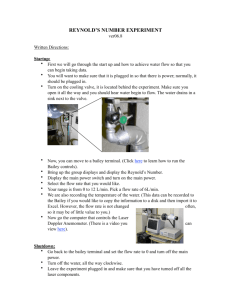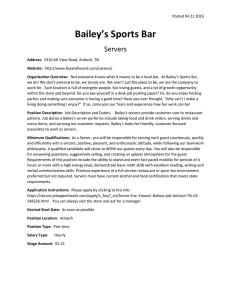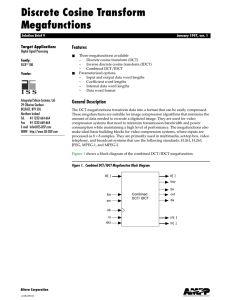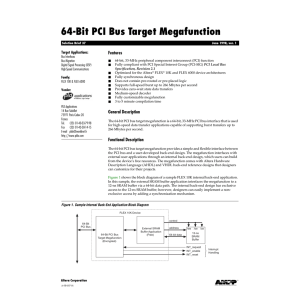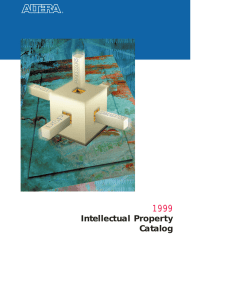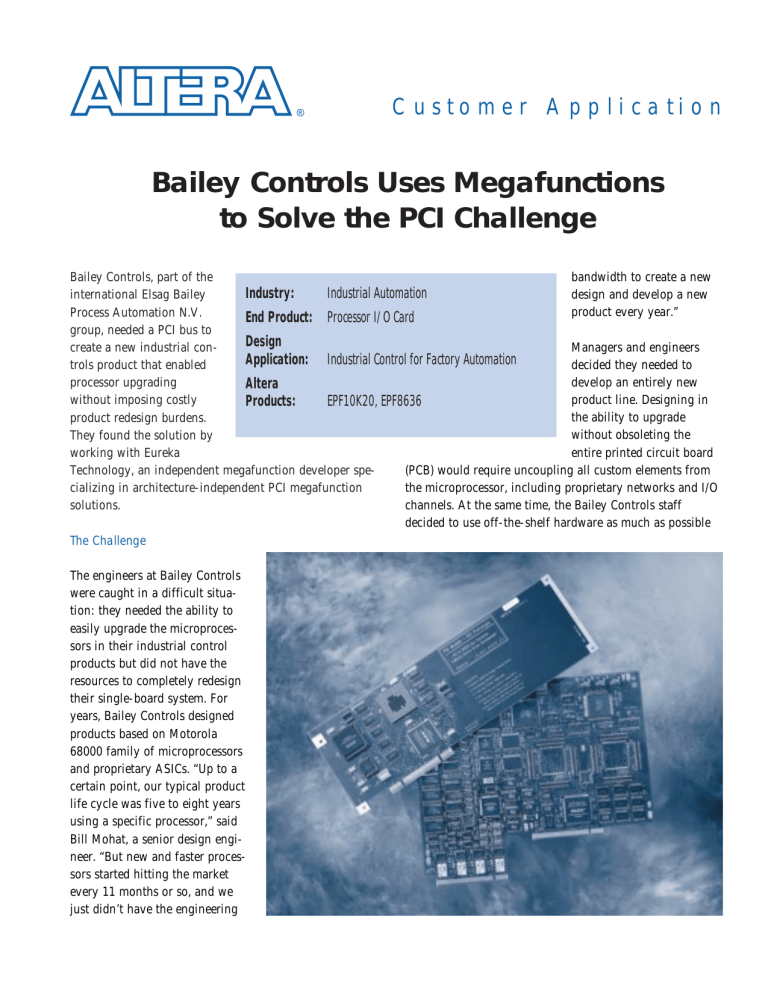
®
Customer Application
Bailey Controls Uses Megafunctions
to Solve the PCI Challenge
bandwidth to create a new
Bailey Controls, part of the
Industry:
Industrial Automation
design and develop a new
international Elsag Bailey
product every year.”
Process Automation N.V.
End Product: Processor I/O Card
group, needed a PCI bus to
Design
Managers and engineers
create a new industrial conApplication: Industrial Control for Factory Automation
decided they needed to
trols product that enabled
develop an entirely new
processor upgrading
Altera
product line. Designing in
without imposing costly
Products:
EPF10K20, EPF8636
the ability to upgrade
product redesign burdens.
without obsoleting the
They found the solution by
entire printed circuit board
working with Eureka
(PCB) would require uncoupling all custom elements from
Technology, an independent megafunction developer spethe microprocessor, including proprietary networks and I/O
cializing in architecture-independent PCI megafunction
channels. At the same time, the Bailey Controls staff
solutions.
decided to use off-the-shelf hardware as much as possible
The Challenge
The engineers at Bailey Controls
were caught in a difficult situation: they needed the ability to
easily upgrade the microprocessors in their industrial control
products but did not have the
resources to completely redesign
their single-board system. For
years, Bailey Controls designed
products based on Motorola
68000 family of microprocessors
and proprietary ASICs. “Up to a
certain point, our typical product
life cycle was five to eight years
using a specific processor,” said
Bill Mohat, a senior design engineer. “But new and faster processors started hitting the market
every 11 months or so, and we
just didn’t have the engineering
®
and remain with the Motorola 68000 family. On top of
these requirements, they faced limited engineering
resources.
To meet the basic criteria, the design needed a bus that was
both processor and clock-rate independent. The peripheral
component interconnect (PCI) bus—a common, but complex
bus technology—fit the criteria, but was unfamiliar to
Bailey engineers. Finally, the Bailey staff settled on a PCIto-68030 bridge that would enable them to create a
modular system enabling easy upgrades.
Bailey engineers looked at a number of alternatives for
implementing the PCI interface. However, general-purpose
devices failed to provide the necessary flexibility. They also
studied hardware solutions developed by other divisions in
their parent company Elsag Bailey Process Automation, but
found these solutions took too many engineering resources
to meet the specific needs of the project.
hardware to get this project up off the ground with a
minimum of trouble. We talked to Simon Lau (Eureka
President) and asked for some changes. We wanted multiple
base address registers and the interrupt set up in a certain
way. In just two days we had a megafunction—containing
all of our requirements—that could be dropped into an
Altera device to turn it into a PCI interface.”
As with most new products, there were final questions to
answer before the new system was ready for production.
“Our PowerPC processor is very abusive of the PCI bus and
when there were back-to-back transfers to different boards,
Eureka’s megafunction mistakenly forwarded the wrong
data byte,” said Mohat. “We made one phone call to Simon
and three hours later we had the new code via e-mail. One
day later we had the new design running.” The entire relationship with Eureka was conducted through e-mail and
over the telephone. Figure 1 shows the prototyping and
end-product hardware developed by Bailey using Eureka’s
PCI megafunction.
The Megafunction Solution
Looking Forward
An Altera field applications engineer (FAE) had worked
with Bailey on programmable logic solutions and was
familiar with the companies participating in the Altera
Megafunction Partners Program (AMPPSM), an alliance of
independent developers. The FAE suggested Bailey work
with Eureka Technology of Los Altos, California, a
company that specializes in PCI and PowerPC bus controller megafunctions.
“We wanted as generic an interface as possible and no one
else had it,” said Mohat. “Eureka took a PCI bus interface
and de-multiplexed it. They had about a dozen or so registers inside the megafunction instead of the 200 we had
found in standard products. And, they had the software and
Altera Offices
Altera Corporation
101 Innovation Drive
San Jose, CA 95134
Telephone: (408) 544-7000
http://www.altera.com
Altera European Headquarters
Holmers Farm Way
High Wycombe
Buckinghamshire
HP12 4XF
United Kingdom
Telephone: (44) 1 494 602 000
Mohat knows that megafunctions will be vital to future
Bailey products. “Megafunctions are the way designs are
going to be created over the next few years,” he said. “As
more and more people start selling larger pieces of intellectual property—either in the form of megafunctions, or
VHDL or Verilog HDL source code—designers will buy more
pieces and integrate them. It appears easier to grab an
ASSP at $25 per piece, but unless you’ve worked with a PCI
bus, you don’t understand how fiendishly complex it is, and
standard products don’t eliminate all that complexity. It’s
far cheaper to use megafunctions when all the costs are
considered.”
Altera Japan Ltd.
Shinjuku Mitsui Bldg. 36F
1-1, Nishi-Shinjuku, 2 Chrome
Shinjuku-ku, Tokyo 163-04
Japan
Telephone: (81) 3 3340 9480
Altera International Ltd.
Suites 908-920, Tower 1
MetroPlaza
223 Hing Fong Road
Kwai Fong, New Territories
Hong Kong
Telephone: (852) 2487 2030
Bailey Controls can be reached on the world-wide web at: http://www.bailey.com.
Copyright © 1997 Altera Corporation. Altera, Altera Megafunction Partners Program, AMPP, FLEX, FLEX 8000, MAX, MAX 7000, MAX+PLUS, MAX+PLUS II, and specific device designations are trademarks of Altera Corporation in the United States and/or other countries. Other brands or products are trademarks of their respective holders. The specifications herein are subject to change without notice.
All rights reserved.
M-CAS-BCCO-01



